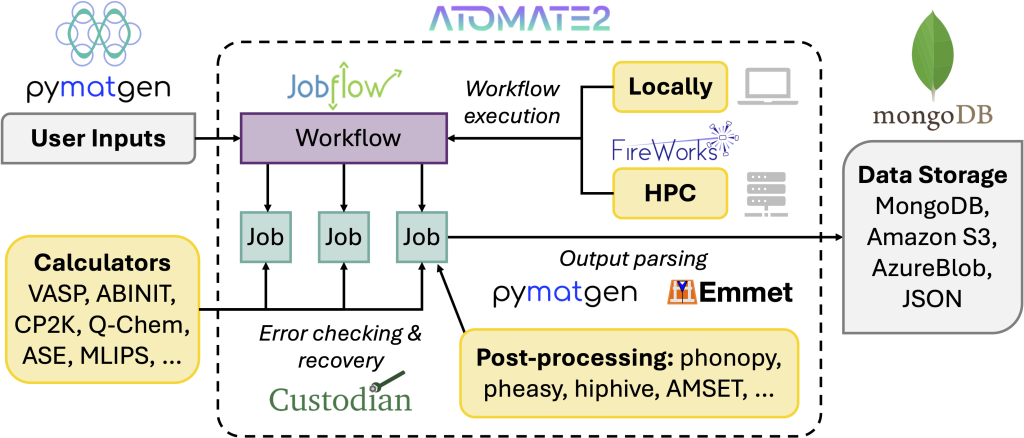Atomate2: modular workflows for materials science

Automated ab initio calculations have emerged as a powerful tool for computational materials science. Automated workflows offer many benefits over traditional manual approaches, including reproducibility, scalability, and useability. This work presents atomate2, a library of over 100 computational materials science workflows. Atomate2 is now the software infrastructure that powers the Materials Project database. Key features include the support for multiple electronic structure packages and interoperability between them, along with generalizable workflows that can be written in an abstract form irrespective of the density functional theory package or machine learning force field used within them. Our hope is that atomate2’s improved usability and extensibility can reduce technical barriers for high-throughput research workflows and facilitate the rapid adoption of emerging methods in computational material science.
Authors: Alex M. Ganose, Hrushikesh Sahasrabuddhe, Mark Asta, Kevin Beck, Tathagata Biswas, Alexander Bonkowski, Joana Bustamante, Xin Chen, Yuan Chiang, Daryl C. Chrzan, Jacob Clary, Orion A. Cohen, Christina Ertural, Max C. Gallant, Janine George,Sophie Gerits, Rhys E. A. Goodall, Rishabh D. Guha,Geoffroy Hautier,Matthew Horton,T. J. Inizan, Aaron D. Kaplan, Ryan S. Kingsbury,Matthew C. Kuner, Bryant Li, Xavier Linn, Matthew J. McDermott, Rohith Srinivaas Mohanakrishnan, Aakash N. Naik,Jeffrey B. Neaton,Shehan M. Parmar,Kristin A. Persson,Guido Petretto,Thomas A. R. Purcell,Francesco Ricci,Benjamin Rich,Janosh Riebesell,Gian-Marco Rignanese,Andrew S. Rosen,Matthias Scheffler,Jonathan Schmidt, Jimmy-Xuan Shen, Andrei Sobolev,Ravishankar Sundararaman,Cooper Tezak, Victor Trinquet, Joel B. Varley,Derek Vigil-Fowler, Duo Wang,David Waroquiers, Mingjian Wen, Han Yang,Hui Zheng,Jiongzhi Zheng, Zhuoying Zhu Anubhav Jain
